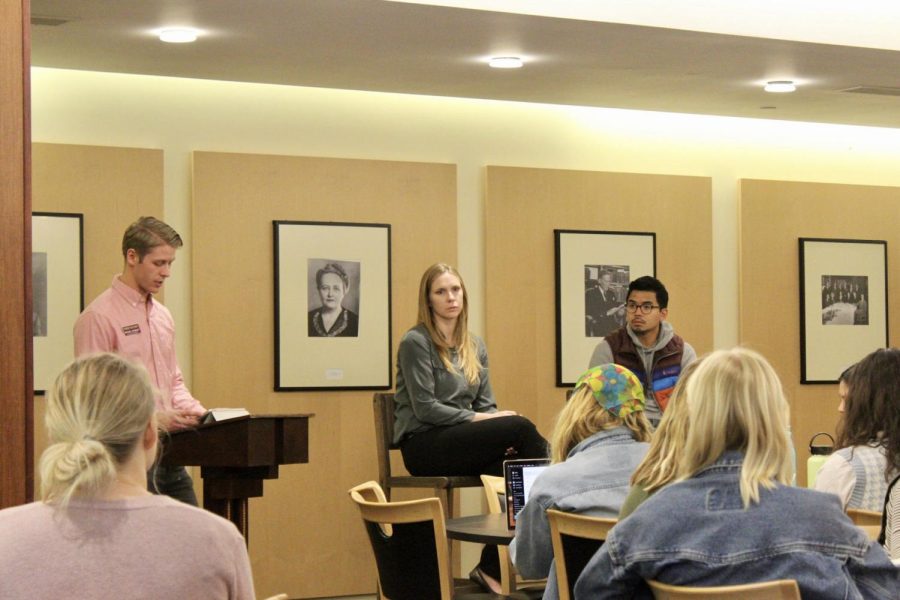WCSA holds panel on Uyghur Muslim oppression
Panelists Dr. Bryant (middle) and Dr. Su (right) answer questions from WCSA Vice President Mitchell Wybenga regarding the Uyghur situation in China.
February 28, 2023
On Feb. 7, Westmont College Student Association (WCSA) united with Emmaus Road as a part of the Global Focus Week to host a panel to shed light on the oppression of the Uyghur Muslim population in China. Mitchell Wybenga, WCSA Vice President, served as the facilitator of a discussion between Dr. Katherine Byrant of the political science department and Dr. Alastair Su of the history department.
During the panel, the panelists shared helpful context regarding the Uyghurs. The Uyghur people are one of 55 ethnic minorities in China, a Turkish minority group in the Xinjiang province which borders the eastern edge of Turkestan. They number roughly around 11 million. This region is also known as the Xinjiang Uyghur Autonomous Region (XUAR) and accounts for one sixth of China’s land mass, with a history of being a site of conflict. In 1756 it was pacified under Qin rule. Furthermore, in the 1860’s, the region witnessed a massive war, and it wasn’t until 1885 that it officially became a part of China.
Dr. Su voiced that framing this conflict against the Uyghurs as being one of Islamic persecution is overly simplistic. In light of this, he asserted that the XUAR is split fairly evenly between two ethnic minorities in China, with about 46% being Uyghurs and 45% identifying as Han, both of whom identify as Muslim. The Han are viewed as “the good or preferred Muslims” while the history of the Uyghurs in the northwest region of China shows that they were part of two attempts to create a separatist state in 1938 and 1945.
However, Su notes that the actions of the government seem to be out of proportion. In the past, it was not necessarily the will of the Uyghurs to create a separate state. Su said, “Both previous times [separatist action] was with Soviet assistance” and had the goal of a secular state which included a minimization of the presence of Islam and a sovietization of the Uyghurs. However, in 2014, there was an act of violence committed in China by Islamic separatist, so Su stated that the “directive [of China] is a long time coming,” even if the state’s action seems to be a bit paranoid.
The actions of China with respect to the Uyghur people have been condemned by the international community and many nations, including the US, Canada, Britain and the European Union (EU), who have labeled it as a genocide in 2021. Genocide is defined by the United Nations (UN) as the “Killling, injuring, forced sterilization or physical destruction of a people committed with intent to destroy, in whole or in part, a national, ethnical, racial or religious group.” China’s treatment of the Uyghur people falls within this definition as policies of forced sterilization, the limiting of children, forcibly separating spouses, abortions and forced IUDs are prevalent among this population
However, Dr. Bryant, who specializes in global politics, noted that it is incredibly difficult to address this issue because of China’s position on the Security Council of the United Nation and with that, their veto power over any decision the UN might present. For example, in a document signed by 38 members of the UN, the request was made to grant the High Commissioner access to the XUAR province, but China has refused. China says that what is occurring there is “internal affairs,” and that UN intervention is violating China’s sovereignty; 60 states signed onto this statement. Bryant asserted that this is the China that Xi Xin Ping wants to present to the rest of the world: “powerful and showing the rest of the world to respect its borders and sovereignty.” She continued, “There hasn’t been this much consolidation [of power] since Mao.”
Su voiced concern, “This is reminiscent of history with the oppression and killing of minorities. It is a little alarming and depressing that we are seeing a failure of a lot of international institutions to do their role.”
In light of this, Wybenga asked what practical action steps the Westmont community could take as Christ followers. Bryant suggested that we can try and reduce the amount of products that we buy that have elements from the Xinjiang province, but cautioned, “Tracing sourcing is hard but it’s something worth doing. If there’s a social movement behind it, it might have more weight.” Su echoed this, saying, “Scrutiny and guilt tripping corporations has been effective. These are the concrete things: how you vote, what you buy,” but he also commented on the existential element, “You have to be sensitive to where the Holy Spirit is calling you. We should be aware of what local churches are doing in China.”
Su acknowledged the mixed legacy of U.S. intervention in China, as well as the reality that Chinese government “has acknowledged that they’re taking very extreme measures, but they say ‘who are you [the U.S.] to judge us?’” He argues that we must recognize the log in our own eye “get the affairs of our own house in order” even as we hold China accountable.

